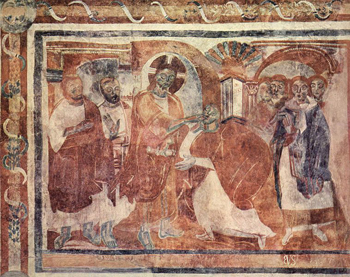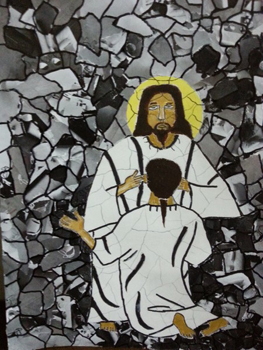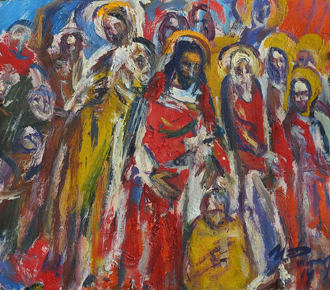For Sunday September 5, 2021
Lectionary Readings (Revised Common Lectionary, Year B)
Isaiah 35:4-7a
Psalm 146
James 2:1-17
Mark 7:24-37
Note: This essay focuses on the latter half of this week’s Gospel reading. For a reflection on Jesus’s encounter with the Syrophoenician woman, see “Be Opened” from the JwJ archives.
This is a hard week for miracle stories. As I look at the heartbreaking images coming out of Afghanistan and Haiti, read reports of American ICUs once again filling to capacity with Covid patients, smell the smoke of catastrophic wildfires here in northern California, and follow Hurricane Ida’s menacing approach towards Louisiana, I turn to the Gospel accounts of Jesus’s miracles — and flinch. I want to trust Scripture’s dramatic stories of healing, deliverance, and transformation. I really do. But sometimes I find it difficult to do so.
In this week’s Gospel, a crowd in the region of the Decapolis brings “a deaf man who has an impediment in his speech” to Jesus for healing. Jesus takes the man aside, puts his fingers into the man’s ears, spits, and touches the man’s tongue. Then he looks up to heaven, sighs, and says to the man, “Be opened.” “Immediately,” Mark’s Gospel reports, the man’s ears are opened, his tongue is released, and he is able to speak plainly. The story ends with the man proclaiming the miracle far and wide — despite Jesus’s order that he keep it a secret — and the crowds expressing astonishment at Jesus, who, in their view, “has done everything well.”
There is much to capture the imagination in this brief, vivid story. But as you’ll notice from my essay title, I’ve spent the past week wondering about two odd little words at its heart: “He sighed.” Jesus sighed. (In some translations, he "murmurs" or "groans.") Before he performs a miracle, before he heals a man who needs his help, the Son of God looks up to heaven and sighs. Why?
 |
I’ll own at the outset that my imaginings about this detail are purely speculative. Maybe I find it intriguing because we’re living through times when the possibility of a divine sigh resonates so deeply. I can relate to it. I can feel it in my body, from my lungs down to my toes. Exhausted sighs. Bewildered sighs. Impatient, frustrated, angry sighs. Jesus looks up to heaven and sighs. Thank God.
But why does he sigh? Some possibilities — or, some reflections on the Gospels’ miracle stories, and what they might mean for us, here and now:
I wonder if Jesus sighs because he’s misunderstood. We know from the witness of the Gospels that Jesus’s mission is to proclaim the good news of the kingdom of God. He comes to teach and to embody what the love of God, the forgiveness of God, the justice of God, and the salvation of God look like. He comes to point beyond himself to the Creator, Deliverer, Defender, and Liberator of all. Everything he says and does is meant to point people in the direction of his Father.
We also know from the witness of the Gospels that many (if not most) of the people who encounter Jesus in his day don’t comprehend this mission at all. They flock to him for magic. Spectacle. Drama. Fireworks. They mistake his “signs” for ends in themselves. They adore him as the One Who Heals, but shy away when he reveals himself as One Who Calls, One Who Convicts, One Who Leads, and One Who Transforms. They embrace him as a conquering hero when he rides a donkey into Jerusalem, but abandon him as a shameful criminal when he acquiesces to a cross, embodying the searing Gospel reality that we must give in order to receive, lose in order to gain, surrender in order to triumph, and die in order to live.
Maybe Jesus sighs in this week’s story because he is the Messiah — the Anointed One, the Son of God, the Savior — who knows that the coming of the kingdom of God is a slow, subtle, arduous, messy, and profoundly costly business. It doesn’t come with the waving of wands and the snapping of fingers. It comes in quiet and often secret ways. It comes by the power of God, yes, but it comes when we take up our crosses and join God in pursuing the good, the compassionate, the risky, and the holy. It comes when we love and follow Christ, not just as our friend and role model, but as our Lord.
And yet “the crowds” (that is, all of us), so often insist on seeing Jesus as nothing more than a peddler of quick fixes. We want him to be a magician — sometimes for earnest, aching, worthy reasons. But that is not who he is. He is not a performer in need of spectators.
 |
I wonder if Jesus sighs because “cures” (as we narrowly define them), are not the point. Wholeness is the point. Restoring the lonely, the isolated, and the ostracized to healthy community is the point. Human flourishing in all of its rich and varied facets is the point.
I know that we (the historic and global church) have failed at times to understand and practice this truth. We have patronized, pitied, ignored, and sometimes mistreated our sisters and brothers who are differently abled than we are. We’ve treated them as second-class citizens. We’ve blocked their access to community, intimacy, worship, and prophetic authority. We’ve prayed for God to “cure” them, instead of doing the harder and more beautiful work of being Christ’s hands and feet, eyes and ears, for those who experience the world differently than we do.
I notice in this week’s story that Jesus pulls the deaf man aside, away from the people who initially request his healing. I wonder if Jesus does this to give the man space to articulate his own hopes and desires. What does he want? Who does he think Jesus is? What word does he need to hear from the Messiah who stands before him? Does his understanding of his body and its abilities align with the crowd’s? With Jesus’s? Or does he have his own story to tell about his deafness?
I believe that Jesus restores this particular man’s ability to hear and to speak because curing him is the only way to make him whole in his specific time and place. In a culture that equates illness and disability with moral failure, in a context where a person’s individual identity is inextricably linked to his familial and religious identities, Jesus recognizes that the man standing in front of him cannot thrive as he is. In his world, his deafness and muteness are death sentences. So Jesus makes the man whole.
And yet Jesus sighs first. Is the sigh an expression of frustration with the crowds who won’t see beyond the man’s deafness? Is Jesus longing for the crowds to experience healing as well? Healing from their toxic assumptions about disability and morality? Healing from their own smug sense of superiority and well-being? Healing from their apathy towards “the least of these?”
I wonder if we can hear Jesus’s sigh from where we stand today. What would it look like for us to become better agents of human flourishing? What would it look like to recognize that in God’s eyes, all of us are in need of healing, wholeness, deliverance, and transformation? That no one — absolutely no one — should seek the kingdom of God and expect to walk away unchanged?
I wonder if Jesus sighs because he grieves the distortion of the good news. As soon as Jesus heals the deaf man, he asks the crowd — orders the crowd — to keep the miracle to themselves. In part, this is because Jesus needs more time. More time to preach, to heal, to teach, and to love. He doesn’t want his growing fame to inflame his enemies and hasten his death.
But I wonder if he also tells the crowds to keep quiet because he’s worried about the stories they disseminate. He’s not interested in amassing a fan club. He doesn’t want to be admired; he wants to be known, recognized, loved, and followed. If anything, he seems baffled and even irritated by the astonishment of the crowds who see his healing of the deaf man as nothing more than a brilliant display of pyrotechnics.
 |
I notice that when Jesus restores the man’s speech and hearing, he does so by inviting the man to “be opened.” Not simply cured or healed. Opened. What does it mean to be opened? Does it mean to surrender? To be surprised? To let go? To become vulnerable? To make room? To give birth? To unclench? To become hospitable? To live fully?
The healing work of Jesus is always more layered than it looks. Its roots run deep, and its implications run wide. I wonder if Jesus sighs because he knows how little the crowds understand about the true opening he longs to enact in their midst. I wonder if he sighs because he’s painfully aware of how his healing stories will be peddled and packaged, dissected and deconstructed. Stripped of nuance and reduced to formula.
If nothing else, I am grateful to know that Jesus’s prayers include sighs. Sighs borne of longing, love, sorrow, and hope, all mingled together. Because if there’s anything the world needs right now, it is Gospel hope. Fierce, creative, tenacious, and daring hope. Precisely the kind of hope Jesus offers. But that hope must be grounded in the truth of who God is and what the kingdom of God actually looks like. In the perilous times we live in, a great deal depends on how we — the church — represent the hope at the heart of Jesus’s life and message. Will we sell easy astonishment? Will we peddle cheap fixes? Will we promise magic? Or will we invite the world to be opened? Opened to surrender? Discipleship? Sacrifice? Obedience?
This week, as our prayers, petitions, and sighs join those of Christ for the life of this world, may we trust in the one who says, “Be opened.” May we listen to him, and be healed.
Debie Thomas: debie.thomas1@gmail.com
Image credits: (1) Wikimedia.org; (2) ArtWanted.com; and (3) Fine Art America.





